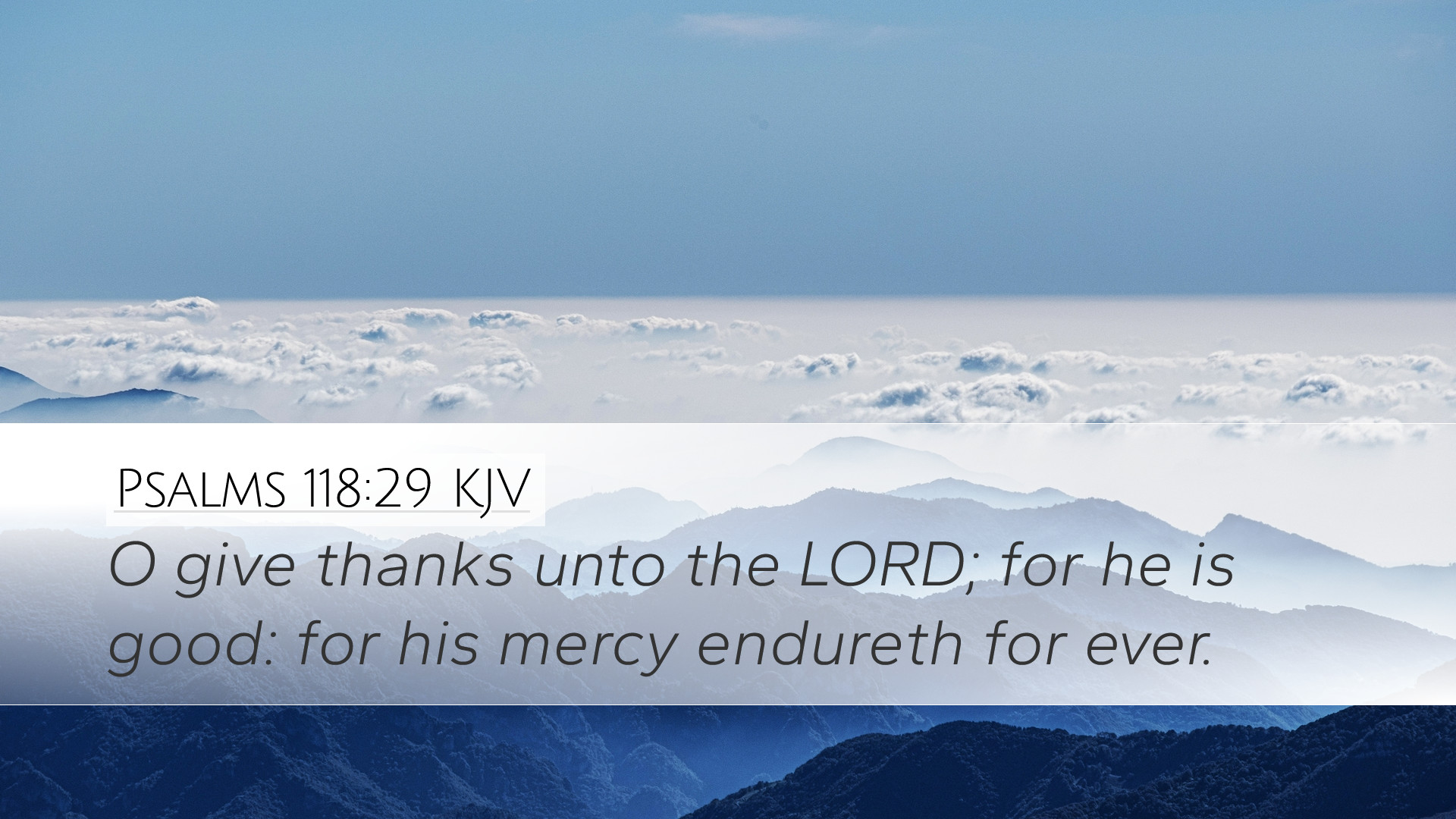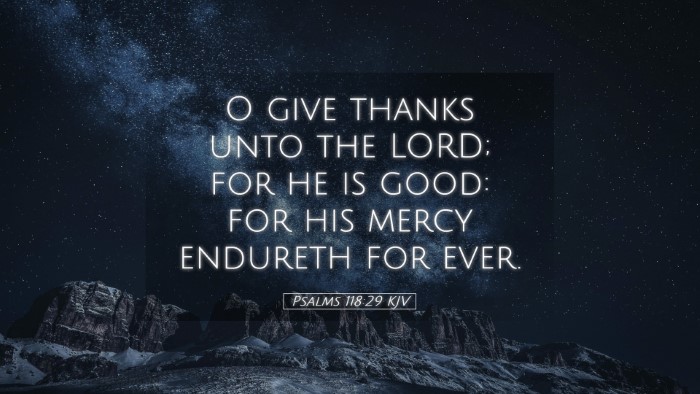Psalms 118:29 Commentary
"O give thanks unto the Lord; for he is good: for his mercy endureth forever."
This verse stands as a concluding proclamation in Psalm 118, summoning the faithful to gratitude. Its repetitive structure emphasizes the importance of appreciation in the life of believers. Below, we explore insights from esteemed public domain commentaries to understand its depth and significance.
1. The Call to Thanksgiving
Matthew Henry's Commentary: Henry highlights the imperative nature of this declaration. He observes that thanksgiving is not merely an act but an essential state of heart for believers. The call to give thanks signifies recognition of God's enduring goodness and mercy. Henry notes that the psalmist concludes the psalm with this poignant reminder, urging believers to cultivate an attitude of gratitude at all times.
Albert Barnes' Notes: Barnes elaborates that this verse should be seen as a summation of the sentiments expressed throughout the psalm. He remarks that the act of giving thanks is inherently linked to understanding God’s character — emphasizing His goodness and mercy, which are fundamental to His nature. The repetition of the phrase "for his mercy endureth forever" serves as a reminder of God's eternal faithfulness, a theme consistently reaffirmed throughout the Psalms.
2. Understanding God's Goodness
Adam Clarke's Commentary: Clarke emphasizes the goodness of God as foundational to the believer's experience. He argues that recognizing God's goodness is transformative; it leads to joy and a renewed sense of purpose. Clarke also points out that God's goodness is not dependent on human circumstances, but rather it is an absolute characteristic of His divine essence.
Spiritual Implications: The acknowledgment of God's goodness prompts a response in the lives of believers. Clarke suggests that the psalmist's invitation is to evoke a deeper trust in God's providence, prompting the faithful to draw nearer to Him in times of joy and sorrow alike.
3. The Nature of God's Mercy
Matthew Henry's Perspective: Mercy, according to Henry, is not only an attribute of God but also a fundamental reason for the believer's life. He explains that God's mercy transcends human understanding; it is everlasting and unfailing. This eternal quality of mercy provides assurance to the faithful that, no matter their situation, they are held in divine compassion. Henry entreats believers to rely on God's mercy and to reflect it in their dealings with others.
Albert Barnes' Insights: Barnes amplifies this with an exposition on the ongoing nature of divine mercy. He states that the phrase “endureth forever” implies that God's mercy is not a one-time occurrence but an everlasting promise. This assurance should embolden believers to approach God in prayer, confessing their weaknesses and seeking His grace without fear of abandonment. The psalmist urges a continual reminder of this mercy as a source of strength and encouragement.
4. The Liturgical Context
Adam Clarke's Observations: The context of Psalm 118 is one of celebration and communal worship. Clarke notes that this psalm, particularly verses like 29, would often be sung in the temple as a part of traditional Jewish liturgy, especially during Passover. The communal aspect of this thanksgiving emphasizes unity in the acknowledgment of God’s goodness and mercy amongst the people.
Application for Modern Worship: In contemporary settings, this verse serves as a powerful liturgical centerpiece. It invites congregations to join in collective gratitude, fostering a sense of community rooted in mutual acknowledgment of God's attributes. This aspect is vital for pastors and leaders in encouraging a culture of thanksgiving within the church.
5. Personal Reflection and Application
As we contemplate Psalm 118:29, it is essential for pastors, students, and theologians to consider how this verse impacts personal faith and practice. This verse serves not only as a reminder of God’s everlasting nature but also as an invitation to reflect on one's own response to God's goodness and mercy.
- Gratitude in Daily Life: Consider practical ways to incorporate thankfulness into everyday activities, recognizing God's hand in both big moments and the mundane.
- Praise in Adversity: Reflect on how the recognition of God’s mercy can bring comfort and strength in challenging times.
- Community Worship: Encourage participation in corporate worship settings with a focus on thanksgiving, celebrating God's goodness together.
Conclusion
Psalm 118:29 encapsulates a profound truth that has reverberated through generations of believers: to give thanks is not merely a duty, but a reflection of an abiding relationship with a good and merciful God. As we integrate these insights from Matthew Henry, Albert Barnes, and Adam Clarke into our understanding, we are equipped to live out a faith marked by gratitude, humility, and communal worship. Let this verse be a constant reminder of the goodness of God and the eternal nature of His mercy, encouraging us to express thanks in every circumstance.


